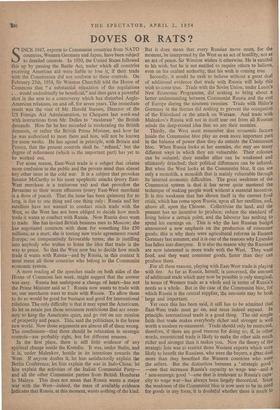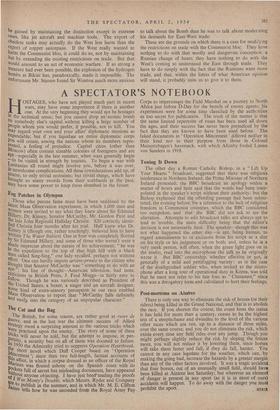DOVES OR RATS ?
SINCE 1947, exports to Communist countries from NATO countries, Western Germany and Japan, have been subject to detailed controls. In 1950, the United States followed this up by passing the Battle Act, under which all countries receiving American aid were liable to lose it, if their trade With the Communists did not conform to these controls. On February 25th, 1954, Sir Winston Churchill told the House of Commons that " a substantial relaxation of the regulations .. would undoubtedly be beneficial," and thus gave a powerful shot in the arm to a controversy which has disturbed Anglo- American relations, on and off, for seven years. The immediate result was the visit of Mr. Harold Stassen, Director of the US Foreign Aid Administration, to Chequers last week-end with instructions from Mr. Dulles to ` moderate ' the British demands. How far he has succeded in moderating the British demands, or rather the British Prime Minister, and how far he was authorised to meet them and him, will not be known for some weeks. He has agreed in principle, with Britain and France, that the present controls shall be ' refined,' but the degree of refinement (which is the important part) has yet to be worked out.
For some reason, East-West trade is a subject that creates more confusion in the public and the private mind than almost any other issue in the cold war. It is a subject that provokes Senator McCarthy to his most apoplectic attacks (every East- West merchant is a traitorous rat) and that provokes the Bevanites to their worst effusions (every East-West merchant is a dove of peace). That the issue has been quiescent for so long, is due to one thing and one thing only: Russia and her satellites have not wanted to conduct much trade with the West, so the West has not been obliged to decide how much trade it wants to conduct with Russia. Now Russia does want to trade. She has invited British business men to Moscow; she has negotiated contracts with them for something like £50 millions, as a start; she is touting new trade agreements round Europe, on comparatively favourable terms; she is instilling into anybody who wishes to listen the idea that trade is the way to peace. So that the West now has to decide how much trade it wants with Russia—and by Russia, in this context it must mean all those countries who belong to the Communist economic system.
A mere reading ©f the speeches made on both sides of the House of Commons last week, might suggest that the answer was easy. Russia has undergone a change of heart—has not the Prime Minister said so ? Russia now wants to trade with us; our merchants want to trade with Russia. To allow them to do so would be good for business• and good for international relations. The only difficulty is that it may upset the Americans. So let us retain just those minimum restrictions that are neces- sary to keep the Americans quiet, and go out on our mission of prosperity and peace. This, said the politicians, is the brave new world. Now those arguments are almost all of them wrong. The conclusions—that there should be relaxation in strategic controls—are probably right, but for different reasons. But it does mean that every Russian move must, for the moment, be interpreted by the West as an act of hostility, not as an act of peace. Sir Winston wishes it otherwise. He is entitled to his wish, but he is not entitled to require others to believe, even on his exalted authority, that his wish is coming true. Secoedly, it would be rash to believe without a great deal of additional evidence that trade with Russia will help this wish to come true. Trade with the Soviet Union, under Lenin's New Economic Programme, did nothing to bring about a better understanding between Communist Russia and the rest of Europe during the nineteen twenties. Trade with Hitler's Germany in the thirties did nothing to prevent the occupation of the Rhineland or the attack on Warsaw. And trade with Malenkov's Russia will not in itself tear out from all Russian minds the deep-rooted idea that we are their enemies. Thirdly, the West must remember that economic factors inside the Communist bloc play an even more important part in the balance of power than they do outside the Communist bloc. When Russia looks at her enemies, she may see many different ways in which they are vulnerable. Their colonies can be seduced; their smaller allies can be weakened and ultimately detached; their political differences can be inflated, But when the West looks at the Communist bloc, it can see only a monolith, a monolith that is mainly vulnerable through its 'internal economic difficulties. The great weakness of the Communist system is that it has never quite mastered the technique of making people work without a material incentive. It is this weakness that has shown itself in the current food crisis, which has come upon Russia, upon all her satellites, and, above all, upon the Chinese. Collectivise the land, and the peasant has no incentive to produce; reduce the standard of living below a certain point, and the labourer has nothing to spend his earnings on. This is why the last Russian budget announced a new emphasis on the production of consumer goods; this is why there were agricultural reforms in Eastern Germany last summer, and it is one of the reasons why Lysenko has fallen into disrepute. It is also the reason why the Russians are now interested in more trade with the West. They want food, and they want consumer goods, faster than they can produce them.
For all these reasons, playing with East-West trade is playing with fire. As far as Russia, herself, is concerned, the amount of additional trade which may now be possible is only marginal, in terms of Western trade as a whole and in terms of Russia's needs as a whole. But in the case of the Communist bloc, for which Russia is the central supplier, the amounts may he both large and important. Yet once this has been said, it still has to be admitted that East-West trade must go on, and must indeed expand. In principle, international trade is a good thing. The old simple faith that trade makes everybody richer and stronger is well worth a modern re-statement. Trade should only be restricted, therefore, if there are good reasons for doing so; if, in other words, unrestricted trade is likely to make the other side much richer and stronger than it makes you. Now the theory of the strategic lists was to restrict those Western exports which were likely to benefit the Russians, who were the buyers, a great deal more than they benefited the Western countries who were the sellers. But the distinction between a ' strategic good' —one that increases Russia's capacity to wage war—and a ' non-strategic good '—one that is irrelevant to Russia's capa' city to wage war—has always been largely theoretical. Since the weakness of the Communist bloc is now seen to be its need for goods in any form, it is doubtful whether there is much to be gained by maintaining the distinction except in extreme cases, like jet aircraft and machine tools. The export of obsolete tanks may actually do the West less harm than the export of copper saucepans. If the West really wanted to harm the Communist bloc, it could do so, not by maintaining but by extending the existing restrictions on trade. But that Would amount to an act of economic warfare. If so strong a Measure had ever been possible, the explosion of the hydrogen bombs at Bikini has, paradoxically, made it impossible. The Unfortunate Mr. Stassen found Sir Winston much more anxious to talk about the Bomb than he was to talk about moderating his demands for East-West trade.
These are the grounds on which there is a case for modifying the restrictions on trade with the Communist bloc. They have nothing to do with that woolly and dangerous Conception. a Russian change of heart; they have nothing to do with the West's coming to understand the East through trade. They have to do simply with the fact that the Russians want more trade, and that, within the limits of what American opinion will stand, it probably suits us to give it to them.



















































 Previous page
Previous page